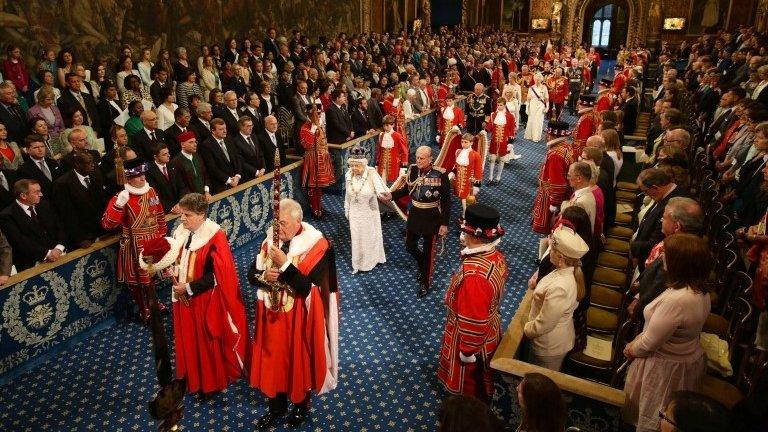Queen's Speech: A programme to transform Britain?
- Published
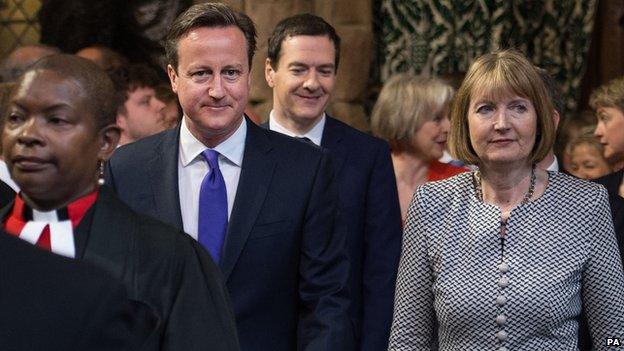
Measures on welfare and tax are designed to consolidate ground taken from Labour at the election
This was the speech David Cameron fully expected the monarch to make. But under different circumstances.
While he always thought a Conservative majority was possible, the pre-election polls pointed to a minority government.
If that happened, today would have been a moment of high drama - would the combined forces of Labour and the SNP vote down the Queen's Speech? Would measures have to be withdrawn or would a new, Labour-led minority administration take over?
Well, in the end, the voters and not the politicians delivered their verdict and while his working majority is small, just a few weeks ago when David Cameron said the polls had caused him stomach ulcers, he would have settled for this outcome.
He is in the driving seat, and has had to park relatively few of his plans.
Journalists have been deprived of the tension of a tight vote and the spectacle of a government teetering on the brink - but that doesn't mean the first Queen's Speech by a Conservative government in nearly two decades was a damp squib.
'Fewer shackles'
There were bills which immediately highlighted their freedom from Lib Dem shackles.
Measures on welfare reform almost certainly wouldn't have been proposed in this form had there been a second coalition.
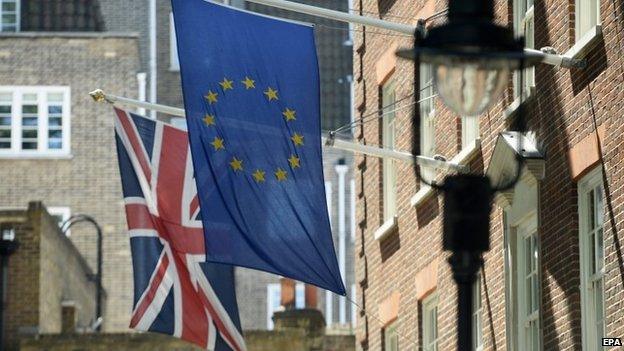
The government has promised an "early legislation" paving the way for the UK's membership of the EU
The main rates of working-age benefits - including tax credits and child benefit - are to be frozen until 2017, the benefit cap is to be lowered, and entitlement to housing support for young adults is to be withdrawn.
If the Lib Dems had signed up to this, they would have insisted on the withdrawal of some benefits from wealthy pensioners too and pushed for their "mansions tax" on high value properties - but those measures are absent from the Queen's Speech.
Similarly, further legislation to limit strike action would have been absent if Vince Cable had still been at the Business Department.
But having swept aside their former coalition partners, politically the Conservatives are focussed on consolidating any ground taken from Labour.
So their welfare reforms are encased in a bill entitled 'Full Employment and Welfare Benefits' - with a commitment to monitoring progress towards achieving full employment and providing more apprenticeships.
'Clear message'
The political message is clear - that the government will help "working people" but not those claiming benefits who, in the words if the prime minister, are "sitting at home".
The Conservatives' own polling highlighted that this was a powerful message especially in the Midlands and southern marginals seized from, or defended from, Labour.
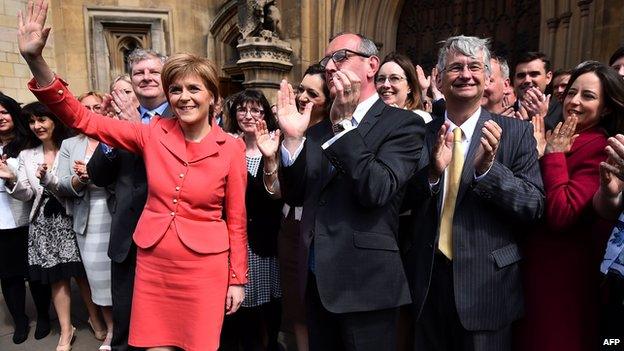
The SNP is likely to make its presence felt as Parliament debates further devolution proposals
The intention is to try to recreate the coalition, not with the Lib Dems, but with people who don't traditionally back the Conservatives, but whose parents may well have voted for Mrs Thatcher before deserting the party for Tony Blair.
The prime minister is even using the language of 'One Nation' - briefly favoured by Ed Miliband.
So there are measures to extend free child care, and the right to buy to housing association tenants, and to ensure those who work thirty hours a week for the minimum wage won't pay income tax.
But it's also interesting to note what isn't in the Queen's Speech.
Labour warned that VAT would have to rise. There will now be a bill to freeze the rate until the end of the parliament. There were warnings from the opposition, too, that child benefit might be cut further, or limited to the first two children.
There is no mention of this. But some of the detail of the welfare cuts may not become apparent until the Chancellor delivers a fully Conservative Budget in just over a month's time.
'Early referendum'
But in some areas, the drama is merely postponed, not defused.
The government ensured that the Queen didn't just make mention of the referendum bill that might have kept some seats secure from UKIP - but that there would be "early legislation".
So straight away the government are seen to deliver on an election promise - but the prime minister is also giving himself the option of holding the vote earlier than his deadline of the end of 2017.
He has united the Conservatives in calling a referendum, but whenever it takes place, the divisions in his own party will become apparent. Inevitably some of his own MPs will denounce what has been re-negotiated as inadequate and call for a No vote.
And the wafer-thin nature of David Cameron's majority has already become apparent.
The manifesto commitment to scrap the Human Rights Act in favour of a new British Bill of Rights did rate a mention in the Queen's Speech.
'Marked difficult'
But while in most areas the monarch talked about "legislation" or "measures" being introduced, on the British Bill of Rights she merely mentioned 'proposals.' So further consultation is likely.
The former frontbencher David Davis has taken this is a signal that the measure will be sidelined and said that it was right to "listen about the folly of abolishing the human rights act in the 800th year of Magna Carta".
Already it would appear that a box marked "difficult" is on the PM's Downing Street desk, and this has been pushed inside.
And there is likely to be trouble ahead, too, in passing the forthcoming Scotland Bill which the government wants on the statute books before the Holyrood elections in a year's time.
Never before have so many SNP MPs occupied the green benches at Westminster and they intend to make their presence felt.
So while the Queen read out the government's commitment to "devolving wide ranging powers to Scotland" and to work with devolved administrations "on the basis of mutual respect", the Scottish Nationalists will push for more - and argue that English-based MPs should not determine the scope of the Scottish Parliament's remit.
The government will also press ahead with plans to deliver English votes for English laws through amending the standing orders of Parliament rather than, for example, through a symbolic "England Bill".
Labour challenge
Some of the prime minister's backbenchers are likely to feel that these measures won't go far enough.
But while much of the next two years will involve arguments around the constitution - from EU membership to human rights to the powers of the Scottish parliament and Welsh and Northern Irish assemblies - make no mistake that there is a majority for much of what is in the Queen's Speech.
If David Cameron maintains that majority for the next few years, Britain will be transformed in ways which are likely to be controversial.
The size of the state will reduce. Working age benefits will be less generous. The deficit will be eliminated. And, if successful, the idea of a 'Northern Powerhouse' will help re-balance the economy away from the south-east.
The last Labour leader had hoped he would be in a position to defeat David Cameron's Queen's Speech today.
The interim leader Harriet Harman didn't engage in any small talk with the prime minister as she walked alongside him to the House of Lords to hear what the monarch had to say.
But she will know the next Labour leader will have to decide how much of this agenda to accept and how much to oppose. But he or she will also have the challenge of creating distinctive policies to appeal to the "working people" the Conservatives have in their sights.
- Published27 May 2015
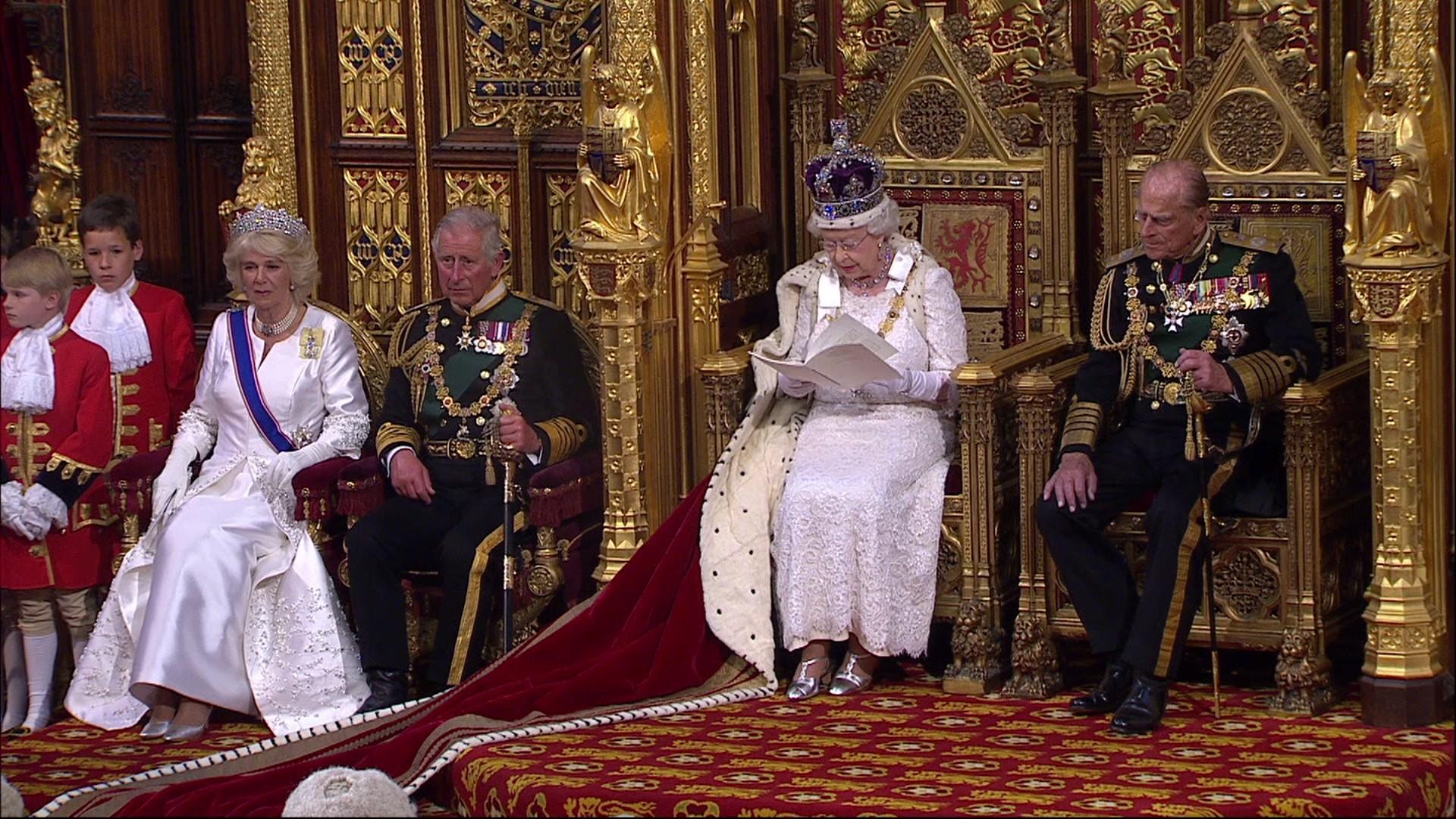
- Published27 May 2015
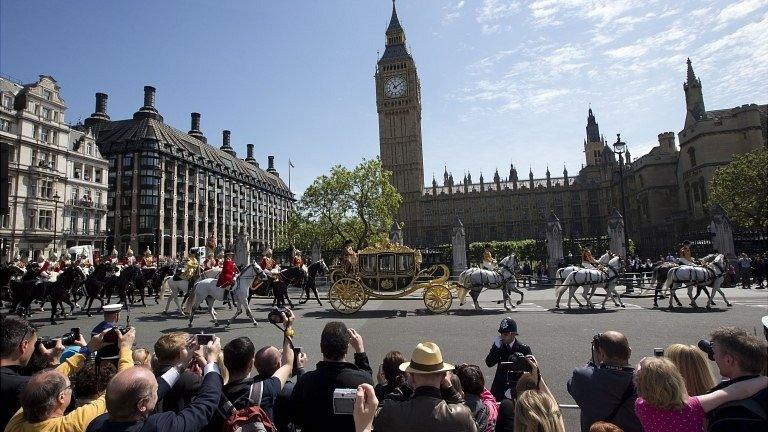
- Published27 May 2015
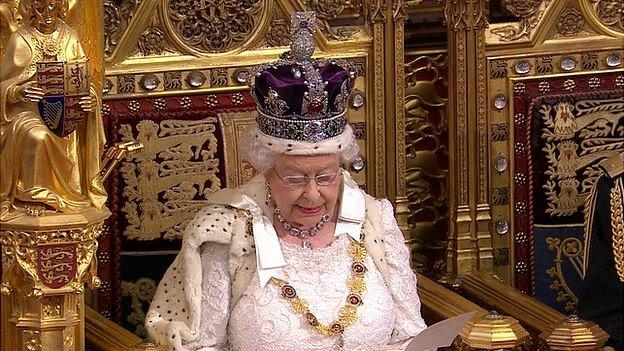
- Published27 May 2015
